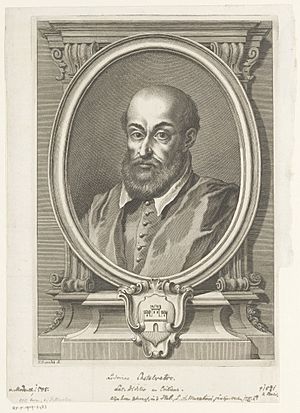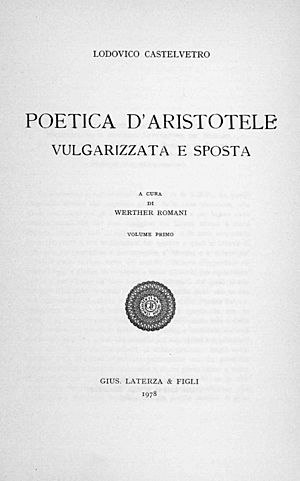Lodovico Castelvetro facts for kids
Quick facts for kids
Lodovico Castelvetro
|
|
|---|---|

Lodovico Castelvetro
|
|
| Born | 1505 Modena, Duchy of Modena
|
| Died | 23 March 1556 (aged 50–51) Chiavenna, Three Leagues
|
| Nationality | Italian |
| Alma mater | University of Siena |
| Occupation |
|
| Era | Renaissance |
| Parent(s) | Giacomo Castelvetro and Bartolomea Castelvetro (née Della Porta) |
| Scientific career | |
| Institutions | University of Modena |
| Influences |
|
| Influenced |
|
Lodovico Castelvetro (born around 1505, died 1571) was an important Italian scholar. He helped shape a new classical style, especially in plays. His ideas about the ancient Greek writer Aristotle led to strict rules for writing drama, known as the Three Unities. Castelvetro was born in Modena, Italy, and passed away in Chiavenna.
Contents
His Life
Early Years and Learning
Lodovico Castelvetro was born into a noble family in Modena. He received a very good education. He studied at several universities, including Bologna, Ferrara, Padua, and Siena. To make his father happy, he earned a law degree from Siena.
However, Lodovico was more interested in literature. Due to poor health, he returned to Modena. There, he actively encouraged others to write and study literature.
Difficult Times and Escape
In 1553, Castelvetro had a big disagreement with another writer named Annibale Caro. This argument started because Castelvetro criticized one of Caro's poems. Their quarrel became very serious.
During this time, the Roman Inquisition became powerful in Modena. This was a church court that investigated people accused of having beliefs against the church. In 1542, Castelvetro and other scholars had to sign a document saying they followed church teachings.
In 1557, the investigations started again. Castelvetro likely went to a safe place in Ferrara. He later went to Rome to try and clear his name. He was accused of translating a work by Philip Melanchthon, a Protestant reformer. After several interviews, he realized the decision would not be in his favor. So, he escaped from detention and fled Rome at night.
Life in Exile
Castelvetro found safety in Chiavenna. In 1561, he and his brother, Giovanni Maria, were declared outcasts by the church. His brother was punished for helping him escape.
Later, Castelvetro asked to explain himself to the Council of Trent, a meeting of church leaders. But the pope insisted he come back to Rome. Instead, Castelvetro went to Lyon, France. There, he worked on his important book, a commentary on Aristotle's Poetics.
In Lyon, he faced more trouble. His house was set on fire. It is said that he only cried out, "Save my Poetics!" He had to leave Lyon and went to Geneva. Then he joined his brother at the court of Emperor Maximilian II in Vienna. The plague soon forced him to leave Vienna. He returned to Chiavenna, where he passed away.
Important Works
Castelvetro's book, Poetica d'Aristotele vulgarizzata e sposta, is his most famous work. It means "The Poetics of Aristotle translated into the common language and commented on." This book is considered the most well-known Italian Renaissance commentary on Aristotle's Poetics.
Another important work is his Giunta. This book is a commentary on Prose della volgar lingua by Pietro Bembo. It is one of the earliest texts about Italian grammar and how languages work. Some people at the time thought his ideas were too complex.
After his Poetics, his best-known work is a commentary on the poems of Petrarch. It is called Le Rime del Petrarca brevemente sposte, published in 1582.
See also
 In Spanish: Lodovico Castelvetro para niños
In Spanish: Lodovico Castelvetro para niños
 | Kyle Baker |
 | Joseph Yoakum |
 | Laura Wheeler Waring |
 | Henry Ossawa Tanner |


